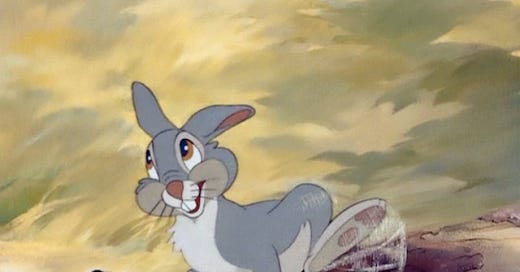Of course, I remember Bambi! Like most children growing up in the early 1950s my parents made sure this Disney film was part of our early childhood education. We were constantly reminded of the scene in which Thumper Rabbit repeats his mother’s timeless admonition: “If you can’t say anything nice, don’t say anything at all. Thump! Thump!” In my experience, though, it seemed a lot of children hadn’t seen the movie or hadn’t taken it to heart.
How often I ran home in tears as a pack of children chased me down the street chanting:
Chinaman, he had a wife
Led him such a miserable life
Led him to the top of a hill
Let him roll like a rolling pill.
They had other chants, too. Uglier ones I prefer not to write.
We moved often, each time hoping to find a kinder, gentler neighbourhood for me and my father. We were the ones with the Asian features. My brother and sister, had my mother’s non-Asian features. Mother had pale skin, light brown hair, and enormous grey eyes. Everything about her screamed “I am not a visible minority person. You mustn’t punch me or spit on me or call me nasty names.”
We were not entirely friendless. Wherever we went, the Jewish children in the neighborhood befriended us. Their mothers taught my mother how to prepare kosher meals so we could eat lunches in each other’s homes. We celebrated Hannukah and Christmas together, exchanging gifts and nibbling on candy canes and chocolate coins, Hannukah gelt.
We were taught not to fight back when taunted. “We are not like those ruffians,” Mother would say. I did run, though – from snowballs in winter and rocks in summer, hands covering my ears, blocking out the hateful insults.
No one calls me names anymore. But I still get “preferential” treatment. I am often detained at the American border. My luggage is searched and I am routinely patted down. I have also been fingerprinted and had my hands wiped for gunpowder residue.
One time, a border guard demanded I phone the college in Vermont where I was working for the summer so that they could fax a letter confirming my employment. I did and they did and when the border guard heard the fax coming in, he said, “Ah, there’s your letter. I’ll just take my lunch now and we’ll deal with this after.”
Once he’d left, another guard told me the idiot guard was new and was just trying to get a promotion. Still, I had to wait an hour for him to finish his lunch and confirm, yes, I was gainfully employed in the U.S. No, I wasn’t trying to become an illegal immigrant.
The CBC has reported that the US has taken to detaining some Canadian citizens for up to a week. We have an important family event planned this summer. I dread crossing that border, and yet, I don’t want to disappoint my children and grandchildren and great grandchildren.
Maybe it’s time to bring Bambi back to the big screen and make it part of mandatory training for American border guards. Surely some of them have something nice to say. If not, I’d be very happy if they didn’t say anything – or do anything – at all.
Pearl Lee is a lifelong storyteller and former teen-in-turmoil. She started writing at an early age, buying a pencil and copybook with her first-ever allowance. Later, she typed mystery stories on a rented typewriter for her sister and cousins. Pearl holds graduate degrees in Creative Writing and Teaching Reading (Response Theory) and Writing.
She was also an active member of the Montreal Storytellers Guild for many years, participating in local events and festivals. Pearl is a member of the London Writers Society and a CANSCAIP Friend.
Zebra-Girl is her first young adult novel. It’s available from Chapters/Indigo here.
See Brian Henry's upcoming weekly writing classes, one-day workshops, and four-day retreats here.
Read more short stories, essays, and poems by your fellow writers here (and scroll down).






This is an incredibly moving story. I am reminded that there is so much meanness in the world AND there is so much kindness. Thanks for sharing this inspiring and honest piece.
What a heartbreaking story, beautifully told by Pearl.
Dr. King once said, ‘The moral arc of the universe is long, but it bends towards justice.” I don’t see much of that these days and despite my natural predilection towards optimism, I often feel despair.
On the first day of my first trip to the US, in 1960 I saw a “Whites Only” sign at a water fountain. This was quite a shock to a sheltered white girl from Toronto. Up until the end of high school, among all my classmates and friends, there had only been two Blacks, three Asians, and three or four Jewish students, all of whom were actually quite popular.
On one occasion, some students organized a trip across the border to one of those TV “dance parties”. Before long, the station started receiving furious calls from viewers outraged to see a Black boy dancing with a white girl. Since this was something completely normal at our school, the situation was a shocker.
Now, I have interracial grandchildren, and I can see that moral arc Dr. King spoke of has indeed ( although at a glacial pace) been bending in the right direction…and yet...